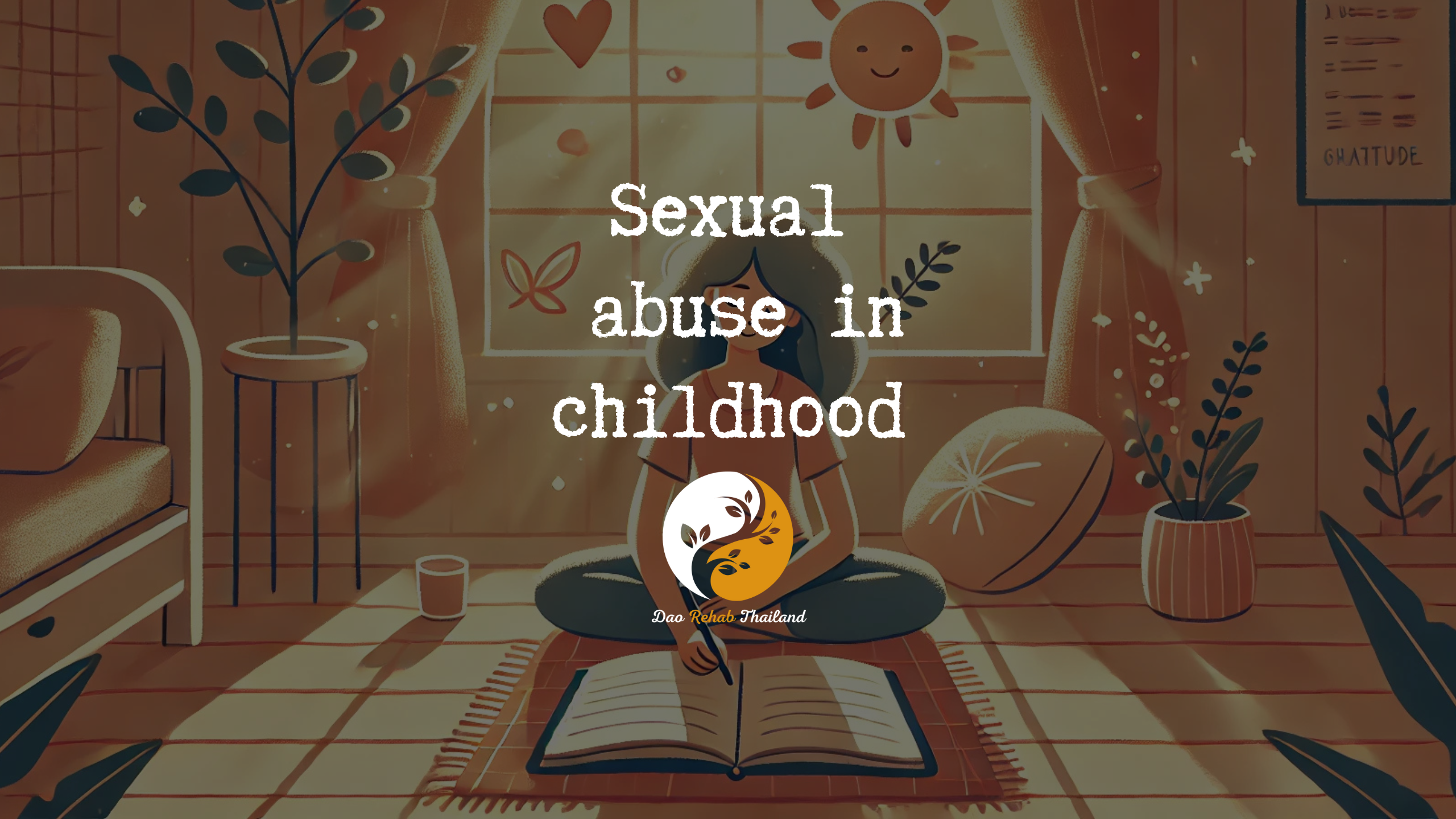
Sexual abuse in childhood
Sexual abuse in childhood
“Turning the impossible into possible”

"Detox from Drugs at a Luxury Holistic Center in Thailand and Israel"

Sexual abuse in childhood
Sexual abuse in childhood is a major factor in the development of psychopathology in adulthood, including eating disorders. Despite the growing awareness of the issue in recent decades, there is still widespread denial and silencing of the phenomenon. The prevalence of sexual abuse in childhood is amazing – about a quarter of girls and up to a fifth of boys experience sexual abuse. The consequences of this early trauma on mental health are enormous.
"Holistic Center for Trauma, Addiction, and Mental Imbalance Treatment in Thailand"
“Come to the beginning of your journey to freedom from addiction to alcohol, drugs, and pills, and rediscover your life within the serene embrace of DaoTherapy Rehab in Thailand—where holistic healing meets empowering recovery.”
DaoTherapy Holistic Rehab
Key Elements of DrugsDetox:
Medical Supervision: Drugs detox must be conducted under medical supervision, as the body may experience withdrawal symptoms. These can include nausea, anxiety, muscle aches, and insomnia. A medical team will monitor and manage these symptoms to ensure the patient’s safety and comfort.
Holistic Therapies:
Holistic Therapies: Many detox programs incorporate holistic therapies such as mindfulness, yoga, and meditation to help individuals cope with stress and anxiety during the detox process. These therapies support the mind-body connection and contribute to overall recovery.
Tapering Process
Tapering Process: Drugs detox often involves a gradual tapering of the drug to reduce withdrawal severity. Doctors will slowly decrease the dosage over time to allow the body to adjust to lower levels of the substance.
Psychological Support:
Psychological Support: Like any addiction recovery process, detox from Drugs includes psychological support. This can involve counseling, therapy, or support groups to address the mental and emotional aspects of addiction.
Post-Detox Treatment:
Post-Detox Treatment: After completing detox, continuing treatment is crucial to prevent relapse. This often includes participation in ongoing therapy, group support, and the development of new coping strategies to maintain sobriety.
The relationship between childhood sexual abuse and eating disorders
The connection between childhood sexual abuse and eating disorders has been known since the dawn of modern psychology. Freud, in his treatment of “hysterical” women, recognized the connection between a traumatic sexual experience in childhood and neuroses in adulthood. He realized that many of his female patients had been sexually abused, but at some point backed away from that theory. Today, up to 70% of women with eating disorders report a history of sexual abuse in childhood. Despite this, many still find it difficult to recognize sexual vulnerability as a central factor in eating disorders.
In many cases, the eating disorder is a disguised language for expressing the terrible secret of the injury. This is an attempt to express the pain and distress without words, because the victimized girl is unable to comprehend or understand what she went through. Sometimes, the eating disorder is a survival and coping strategy – a kind of “chemotherapy” or self-medication against the feelings of dirtiness and guilt. It also gives an illusion of control and power after an experience of total helplessness.
One of the challenges in treatment is that a high percentage of victims do not remember the injury due to dissociation and repression. Many times the memory floats only years after the trauma. Therefore, therapists should be aware of the signs and possibility of trauma even if it is not spoken. Changing the view from eating disorder to complex PTSD, as a complex post-traumatic disorder, can improve the quality of diagnosis and treatment.
The accepted treatment protocols for eating disorders are sometimes harmful to trauma victims. They focus on the body instead of the person, the symptom instead of the root of the problem. Forceful methods of coercion and punishment may cause re-traumatization and damage the recovery process. Instead, there is a need for trauma-oriented treatment – rehabilitative, humanistic and democratic methods that respect the patient and her voice. Benevolent and empathetic therapeutic relationships are critical to recovery.
Adopting the perspective of eating disorders as an expression of complex trauma is not simple. It requires a change in thinking and therapeutic infrastructures, as well as appropriate training of professionals. But this is a necessary way if we want to provide an adequate and effective response to the deep plight of so many women. Without understanding and acknowledging the hidden wounds of the soul, we will not be able to truly heal the visible disorder. Only treatment that sees the whole person, for all their pain and strength, can lead to a real and sustainable return.

contact us
Contact us with your questions
We would love to speak with you! Feel free to reach out with any questions.

get in touch
Schedule a free consultation
Schedule a free consultation with our team and let’s make things happen!
Childhood sexual abuse and eating disorders: the hidden connection
Sexual abuse in childhood is one of the most significant factors in the development of mental problems in adulthood, including eating disorders. Despite the increase in awareness of the issue in recent decades, there is still a lot of denial and the phenomenon is often hidden from the public eye. The numbers are chilling – about a quarter of girls and up to a fifth of boys are sexually abused at some point in their childhood. The consequences of this early trauma on mental health are devastating and lasting.
The roots of insight: from Freud to the present day
The connection between childhood sexual abuse and eating disorders has been known since the beginning of modern psychology. Sigmund Freud, in his treatment of women who were then called “hysterics”, recognized the connection between a traumatic sexual experience in childhood and neuroses in adulthood. In his early writings, he clearly argued that the sexual abuse was the main cause of the hysterical symptoms. However, at some point Freud withdrew from this theory, perhaps due to social pressure and the difficulty of accepting the extent of the phenomenon. Today, research shows that up to 70% of women suffering from eating disorders experienced sexual abuse in their childhood. Despite the clear evidence, there is still much resistance to recognizing sexual trauma as a major factor in the development of eating disorders.
Eating disorder: an unspoken language of pain
In many cases, the eating disorder is used as a disguised language, a way to express the dark secret of the injury without mentioning it in words. It is a desperate attempt of the mind to communicate the pain and distress, when the victimized girl is unable to conceptualize or understand what she has been through. It carries within it an unimaginable experience that has no words or mental representations. Through the obsessive preoccupation with food and the body, she tries to tell the untold story.
Eating disorder as a survival strategy
The eating disorder sometimes constitutes a kind of survival and coping mechanism for the victim. Like “chemotherapy” or self-medication, it is used to dull the feelings of filth, guilt and shame. Through the reduction and control over the body, the victim tries to regain a sense of strength and resilience in the face of an experience of complete loss of control. While behaviors such as starvation, vomiting or compulsive exercise are destructive to the body, they provide temporary relief from the unbearable mental pain.
Dissociation: The Hidden Challenge in Therapy
One of the significant challenges in treating victims is the phenomenon of dissociation. A significant percentage of women with eating disorders due to sexual abuse do not remember the injury due to a mental defense mechanism that disconnects memory from awareness. Often the injury surfaced only years after it occurred, when the woman was already developing symptoms. Therefore, it is very important that therapists in the field be alert for signs of sexual trauma even when the patient does not explicitly report it. Seeing the disorder as part of the PTSD complex (complex post-traumatic stress disorder) can significantly improve the ability to locate and treat the root of the problem.
The limitations of the standard treatment of eating disorders
Unfortunately, many protocols for the treatment of eating disorders do not take into account the traumatic history and therefore may cause additional harm to the victims. The traditional approaches focus on the symptom – the obsession around food and weight – instead of referring to the whole person and the experience at the root of the difficulty. Forceful techniques, such as forced hospitalization, forced feeding and punishment are common in treatment and may trigger re-traumatization in those who have experienced injury and penetration of their body in the past. In this way, the system may inadvertently create a repetition of the injury and perpetuate the cycle of disorder.
Towards a new therapeutic model: trauma-oriented and inclusive
The first step towards more effective and beneficial treatment is to change the perception – moving from a focus on the eating disorder to looking at the complex reality of trauma and its effects. Instead of focusing on symptoms, one should invest in creating safe, empathetic and inclusive therapeutic relationships. When the patients feel understood, appreciated and valuable beyond their disorder – the door opens to process the pain and real recovery.
The trauma-oriented treatment model emphasizes the importance of inclusion, stability and partnership in the therapeutic relationship. Instead of strict and punitive methods, therapists learn to listen to the inner voice and the emotional needs of the patients. The emphasis is on strengthening the sense of self, developing emotional regulation skills and building coping resources. Within a safe and supportive space, the patient can gradually reveal her life story and weave it anew.
Adopting a holistic view of eating disorders and the underlying trauma is not an easy task. A change in professional thinking and therapeutic infrastructure is required, as well as specific training for teams. But this is the necessary direction if we want to offer real healing to so many women who carry deep pain in their bodies and souls. Continuing to ignore the connection between sexual abuse and eating disorders will only continue the destructive cycle and leave hidden bleeding wounds.
Acknowledgment, understanding and compassion: the path to change
Ultimately, the ultimate cure lies in our ability as a society to create a space for open discourse about childhood sexual abuse and its long-term effects. The more we allow the stories to be heard, the pain to be contained and the silence to be broken – the more we can ease the suffering of many. We need wider awareness, accessible support services and skilled professionals who know how to identify the link between trauma and disorder. This is a big challenge, but one with huge potential for healing and change.
In a dark world of shame and concealment, recognition is a ray of light. When we are able to look at the hidden wounds with compassion, listen to the whispers of the suffering body and see the person in full – we open a door to hope. For every woman struggling with an eating disorder and past trauma, the message must be clear: you are not alone, there are those who understand and there is a way forward. Let’s walk in it together, with courage and love.
Key insights:
1. Sexual abuse in childhood is a major cause of psychopathology in adulthood, including eating disorders.
2. Eating disorders are often a masked language for terrible secrets of sexual abuse.
3. The culture of thinness does not create eating disorders, but is a convenient cultural means of expressing distress.
4. An eating disorder can be used as “chemotherapy” or a survival strategy for victims.
5. Moving from a diagnosis of eating disorder to complex PTSD can significantly improve treatment.
6. Trauma-oriented, humane and democratic treatment is more suitable for victims than forceful approaches.
7. It is important to recognize eating disorders as a symptom of complex trauma, alongside other symptoms.
8. Both force and neglect must be avoided in the treatment of sexual assault victims.
9. The therapist should give space to the voice of the patients and not speak in their place or for them.
10. Knowledge of trauma, healing relationships and prevention of re-traumatization are central principles in treatment.
Practical advice:
1. Don’t be ashamed to ask for help and seek appropriate treatment that recognizes your trauma and unique needs.
2. Remember that the disorder and symptoms are not your fault – they are a result of the injury you experienced and your way of survival.
3. Let yourself feel the pain, anger and sadness, but don’t wallow in self-blame.
4. Look for healthy and empowering relationships that respect you and give you a sense of security.
5. Focus on your strengths, skills and healthy parts, and not just on difficulties and symptoms.
6. Believe in your ability to heal and grow. It is a process, but there is treatment and hope.
Psychological Support:
Psychological Support: Like any addiction recovery process, detox from Subutex includes psychological support. This can involve counseling, therapy, or support groups to address the mental and emotional aspects of addiction.
Thought-provoking questions
1. How does the understanding of the connection between childhood sexual abuse and eating disorders change your perception of these disorders?
2. What ideas or insights did you have about creating safer and more adapted treatment spaces for victims of sexual trauma?
3. What do you take away from the lesson regarding the need for a holistic view of the patient beyond the specific symptom?
4. How can you help create a more open discourse and a more inclusive society towards victims of sexual assault?
5. What other ways do you suggest to improve the treatment and understanding of eating disorders due to sexual trauma?








